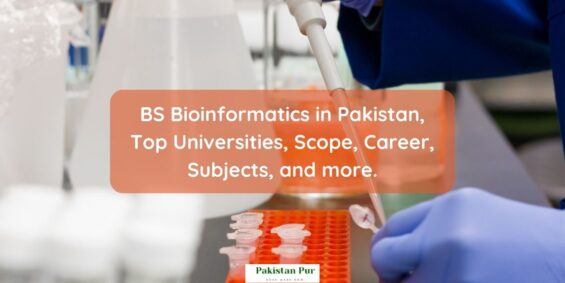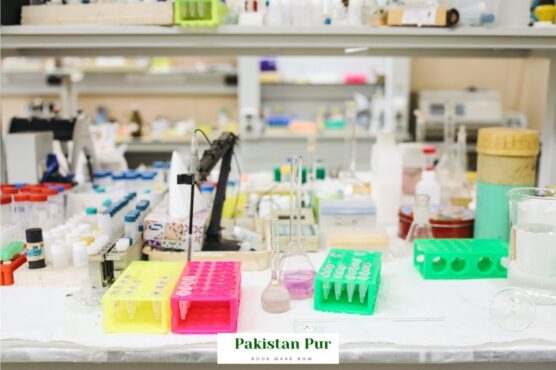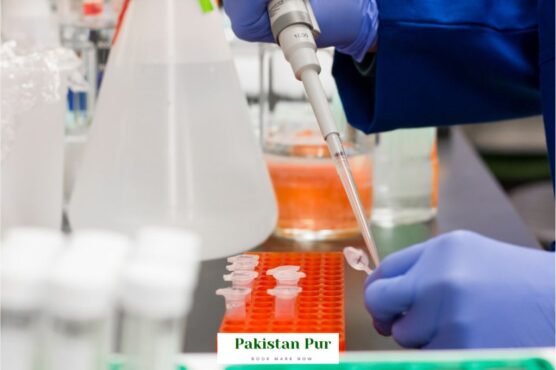
Table of Contents
What is BS bioinformatics in Pakistan?
Bioinformatics is an interdisciplinary field that combines biology, computer science, and information technology. It’s a rapidly evolving discipline with immense potential in the areas of healthcare, agriculture, and life sciences. In Pakistan, a Bachelor of Science (BS) in Bioinformatics is a 4-year degree program designed to meet the needs of this diverse, fast-paced field.
The curriculum for BS bioinformatics generally includes a mix of general and specialized courses. General courses may cover fundamental topics in biology, computer science, mathematics, statistics, and English. Specialized courses usually focus on the principles and applications of bioinformatics, including computational biology, genomics, proteomics, and database management.
Practical training is also a significant part of the program. Students get hands-on experience by working with various software tools and databases for manipulating biological data. Some universities also require students to complete a research project or thesis in their final year.
This Ultimate Guide to BS Bioinformatics is a part of the series on the best degrees you can do after FSc pre medical. Read our full article here.
Best Degrees after FSc Pre Medical in Pakistan

BS Bioinformatics Universities in Pakistan
These universities offer BS Bioinformatics in Pakistan. You can search for a university or a city in the table.
| Institution | City | Program | Private / Public |
|---|---|---|---|
| The Islamia University Of Bahawalpur | Bahawalpur | BS , 4 Years | Public |
| Gomal University | Dera Ismail Khan | BS , 4 Years | Public |
| Government College University | Faisalabad | BS , 4 Years | Public |
| University Of Agriculture | Faisalabad | BS , 4 Years | Public |
| Comsats University | Islamabad | BS , 4 Years | Public |
| Quaid-e-Azam University | Islamabad | BS , 4 Years | Public |
| Khushal Khan Khattak University | Karak | BS , 4 Years | Public |
| Virtual University Of Pakistan | Lahore | BS , 4 Years | Public |
| Hazara University | Mansehra | BS , 4 Years | Public |
| Kohsar University | Murree | BS , 4 Years | Public |
| University Of Okara | Okara | BS , 4 Years | Public |
| Shaheed Benazir Bhutto Women University | Peshawar | BS , 4 Years | Public |
| The University Of Agriculture | Peshawar | BS , 4 Years | Public |
| Khawaja Fareed University Of Engineering & Information Technology | Rahim Yar Khan | BS , 4 Years | Public |
| Fatima Jinnah Women University | Rawalpindi | BS , 4 Years | Public |
| Pir Mahar Ali Shah Arid Agriculture University | Rawalpindi | BS , 4 Years | Public |
| University Of Sialkot | Sialkot | BS , 4 Years | Private |
| Baqai Medical University | Karachi | BS , 4 Years | Private |
| The Superior University | Lahore | BS , 4 Years | Private |
| The University Of Lahore ( Main Campus ) | Lahore | BS , 4 Years | Private |
| Comsats University Islamabad ( Sahiwal Campus ) | Sahiwal | BS , 4 Years | Public |
| Shaheed Benazir Bhutto Women University Peshawar, Sub Campus | Swabi | BS , 4 Years | Public |
| Riphah International University, Faisalabad Campus | Faisalabad | BS , 4 Years | Private |
| The University Of Lahore, Sub Campus | Sargodha | BS , 4 Years | Private |
| Government Postgraduate College ( Mandian) | Abbottabad | BS , 4 Years | Public |
| Pak- Austria Fachhuochschule, Institute Of Applied Sciences And Technology | Haripur | BS , 4 Years | Public |
| Royal Gorup Of Colleges | Gujranwala | BS , 4 Years | Private |
| Baqai Institute Of Information Technology | Karachi | BS , 4 Years | Private |
| Central Park College Of Allied Health Sciences | Lahore | BS , 4 Years | Private |
| International Institute Of Science, Arts And Technology | Gujranwala | BS , 4 Years | Private |
| Prime Institute Of Health Sciences | Islamabad | BS , 4 Years | Private |
| Federal Institute Of Health Sciences | Lahore | BS , 4 Years | Private |
| Gulab Devi Post Graduate Medical Institute | Lahore | BS , 4 Years | Public |
| Federal Institute Of Health Sciences | Multan | BS , 4 Years | Private |
| Fedral Institute Of Health Sciences | Muzaffarabad | BS , 4 Years | Private |
| The Limit Institution Of Health Sciences | Sahiwal | BS , 4 Years | Private |
Read our guide below to understand the scope of BS bioinformatics in Pakistan and BS bioinformatics salary.
Scope Of BS Bioinformatics In Pakistan
BS Bioinformatics Subjects in Pakistan
A Bachelor of Science (BS) in Bioinformatics is a four-year degree program that combines biology, computer science, and information technology to analyze and interpret biological data. The subjects taught in this program in Pakistan are designed to provide students with a well-rounded understanding of both the biological and computational aspects of the field.
Bioinformatics Subjects
- Cell Biology: This subject provides an understanding of the structure and functions of cells, the basic unit of life.
- Fundamentals of Genetics: This course introduces students to the principles of genetics, including heredity, DNA, genes, and genetic variation.
- General Chemistry: Students learn about the basic principles of chemistry, including atomic structure, chemical bonding, reactions, and thermodynamics.
- Introduction to Computing: This subject provides an introduction to the fundamental concepts of computing and programming.
- Bioinformatics Computing I: This course provides an introduction to the tools and techniques used in bioinformatics.
- Genomics: This subject deals with the study of genomes, including sequencing, mapping, and functional genomics.
- Proteomics: Students learn about proteomics, the large-scale study of proteins.
- Graphics and Visualization: This course introduces students to the techniques for visualizing biological data.
- Microbiology and Immunology: This subject covers the study of microorganisms and the immune system.
- Technical Report Writing: This course equips students with the skills to write scientific reports and papers.
Bioinformatics Curriculum HEC
Here is HEC bioinformatics curriculum.
BS Bioinformatic: Semester 1
- English Comprehension
- Pakistan Studies
- Islamic Studies/Ethics
- Basic Biology* OR Basic Mathematics*
- Chemistry
- Computer Fundamentals
BS Bioinformatic: Semester 2
- Probability and Biostatistics
- Basic Cell Biology
- Programming Fundamentals
- Basic Calculus
- Biochemistry I
BS Bioinformatic: Semester 3
- Technical Report Writing
- Linear Algebra and Differential Equations
- Essentials of Genetics
- Communication skills
- Data Structure and Algorithms
BS Bioinformatic: Semester 4
- Bioinformatics I
- Biochemistry II
- Molecular Biology
- Object Oriented Programming
- Social sciences subject
BS Bioinformatic: Semester 5
- Discrete Structures
- Recombinant DNA technology
- Database Management Systems
- Ethical and Legal Issues in Bioinformatics
- Bioinformatics II
- Genomics
BS Bioinformatic: Semester 6
- Bioinformatics Computing I
- Modeling and Simulation
- Proteomics
- Graphics and Visualization
- Systems Biology
BS Bioinformatic: Semester 7
- Artificial Intelligence
- Bioinformatics Software Engineering
- Elective I
- Elective II
- Special Topics in Bioinformatics
BS Bioinformatic: Semester 8
- Bioinformatics Computing II
- Elective III
- Elective IV

Admission Criteria for BS Bioinformatics in Pakistan
To be admitted into the BS Bioinformatics program in Pakistan, students must meet certain criteria. These requirements may vary slightly from one institution to another but generally include the following:
Educational Requirements
- Completion of Intermediate/Higher Secondary School Certificate (HSSC): Applicants must have completed their Intermediate or Higher Secondary School Certificate (HSSC) or an equivalent level of education.
- Minimum Grade Requirement: Some universities require a minimum of 45% marks in FSc/FA/DAE or equivalent.
Credit Hours Requirements for Degree
For the award of a four-year BS in Bioinformatics degree, students are typically required to complete at least 132 credit hours according to a prescribed scheme.
Additional Requirements
Some universities may have additional admission requirements such as entrance exams or interviews. It is advisable for prospective students to check the specific admission criteria from the official websites of the universities they are interested in.
It’s important to note that meeting the minimum admission requirements does not guarantee admission, as many universities use a merit-based system for selecting candidates. This system takes into account various factors like grades, entrance exam scores, and sometimes even extracurricular activities.
BS Bioinformatics Fee Structure in Pakistani Universities
BS Bioinformatics Fee In Islamic University Islamabad
BS Bioinformatics 4 Years Program Fee Structure at IIUI
- Admission Fee: Rs. 7,000
- University Dues: Rs. 87,400
- Library Security: Rs. 7,000
- Total Fee: Rs. 101,400
- Hostel Dues Per month: Rs. 4600
- Hostel Security: Rs. 7000
Comsats Fee Structure For BS Bioinformatics
BS Bioinformatics 4 Years Program Fee Structure at COMSATS Islamabad
- Admission Fee: Rs. 22,000
- Semester Fee: Rs. 107,000
- Total 1st Time Fee: Rs. 129,000
Important Note: Please make sure to confirm fee and other details about the degree at a university before applying for admission.
BS Bioinformatics Universities in Pakistani Cities
You can find the full list of all the BS bioinformatics universities in different cities of Pakistan.
BS Bioinformatics Universities in Lahore
These universities offer BS Bioinformatics in Lahore.
- Virtual University Of Pakistan
- The Superior University
- The University Of Lahore ( Main Campus )
- Central Park College Of Allied Health Sciences
- Federal Institute Of Health Sciences
- Gulab Devi Post Graduate Medical Institute
BS Bioinformatics Universities in Karachi
These universities offer BS Bioinformatics in Karachi.
- Baqai Medical University
- Baqai Institute Of Information Technology
Universities Offering Bioinformatics In Islamabad
These universities offer BS Bioinformatics in Islamabad and Rawalpindi.
- Comsats University
- Quaid-e-Azam University
- Prime Institute Of Health Sciences
- Fatima Jinnah Women University
- Pir Mahar Ali Shah Arid Agriculture University
BS Bioinformatics Universities in Peshawar
These universities offer BS Bioinformatics in Peshawar.
- Shaheed Benazir Bhutto Women University
- The University Of Agriculture
BS Bioinformatics Universities in Faisalabad
These universities offer BS Bioinformatics in Faisalabad.
- Government College University
- University Of Agriculture
- Riphah International University, Faisalabad Campus
BS Bioinformatics Universities in Multan
These universities offer BS Bioinformatics in Multan.
- Federal Institute Of Health Sciences

Bioinformatics Vs Biotechnology
Both Bioinformatics and Biotechnology are interdisciplinary fields that combine biology with other disciplines. However, they each have unique focuses and applications.
Bioinformatics
Bioinformatics is a field that combines biology, computer science, information engineering, mathematics, and statistics to analyze and interpret biological data. It’s often used in genetic mapping, gene expression profiling, predicting protein structure, and more.
Key aspects of Bioinformatics include:
- Use of computer science to understand and organize biological data.
- Development of software tools for understanding biological data.
- Analysis of genes and proteins; study of genetic variation and patterns.
Biotechnology
Biotechnology, on the other hand, is a broad area of biology involving living systems and organisms to develop or make products. It often involves the genetic manipulation of microorganisms for the production of antibiotics, hormones, etc.
Key aspects of Biotechnology include:
- Use of living systems and organisms in technology.
- Genetic manipulation for product development.
- Applications in various sectors like health care, crop production, agriculture, and the environment.
Comparison
While both fields involve the use of biology and technology, their applications and focus differ:
- Data vs Application: Bioinformatics is more concerned with managing and interpreting complex biological data. Biotechnology focuses on applying biological knowledge to develop useful products.
- Computer Science vs Lab Work: Bioinformatics involves more computer-based work, developing and using software tools to analyze biological data. Biotechnology involves more lab-based work, conducting experiments with living organisms.
- Scope and Career: Both fields offer promising careers. Bioinformaticians often work in research institutes, pharmaceutical companies, or as software developers. Biotechnologists can work in various industries like healthcare, agriculture, environmental conservation, etc.
In conclusion, both Bioinformatics and Biotechnology have their unique strengths and applications. The choice between the two would depend on your interest – whether it’s in analyzing big biological data or in manipulating biological processes for creating products.
Bioinformatics Vs Data Science
Definition
Bioinformatics
- A specialized field that combines biology, computer science, information engineering, mathematics, and statistics to analyze and interpret biological data.
Data Science
- A broad field that uses scientific methods, processes, algorithms, and systems to extract knowledge and insights from structured and unstructured data.
Scope and Application
Bioinformatics
- Primarily used in the field of biology and medicine, such as genomics, proteomics, and drug discovery.
Data Science
- Used across various industries, including finance, marketing, healthcare, transportation, and more.
Skills Required
Bioinformatics
- Requires a strong background in biology along with computer science skills such as programming (Python, R), statistics, and machine learning.
Data Science
- Requires skills in mathematics, statistics, programming (Python, R, SQL), machine learning, and data visualization.
Goals
Bioinformatics
- The main goal is to understand biological processes with the help of computational models.
Data Science
- The primary goal is to make informed business decisions by extracting valuable insights from data.
Conclusion
While both Bioinformatics and Data Science deal with data analysis, they differ significantly in their focus areas. Bioinformatics specifically deals with biological data, while Data Science has a broader application across various industries.
Comparison Table of Virtual University and NUST Courses for BS Bio-Informatics
In the table below, I have shared courses and Fees of NUST and Virtual University for BS Bio Informatics for a comparison.
| Semester | NUST | Virtual University |
|---|---|---|
| Fee Structure | Admission fee 35000 Security deposit 10000 Tuition Fee Semester 149000 Misc. charges 2700 | Admission Fee 1,500 Registration Fee 2,000 Security. 2,000 Tuition Fee/credit hour 500 Enrollment Fee/Semester 1,000 |
| Semester 1 | Islamic Studies Pakistan Studies English-I Introduction to Biology * OR Basic Mathematics* Chemistry | English Comprehension Cell Biology (Theory) Basic I-Biology Basic II-Chemistry Introduction to Computing General Mathematics Pakistan Studies Ethics (for Non-Muslims) Islamic Studies Cell Biology (Practical) Introduction to e-Learning |
| Semester 2 | Probability and Biostatistics Cell Biology Fundamentals of Programming for BI Biochemistry-I | Biochemistry I (Theory) Introduction to Programming Business and Technical English Writing Calculus And Analytical Geometry Essentials of Genetics (Theory) Biochemistry I (Practical) Essentials of Genetics (Practical) Introduction to Programming (Practical) |
| Semester 3 | Communication and Interpersonal Skills Technical Writing Linear Algebra & ODEs General Genetics | Bioinformatics I Data Structures Business Communication Molecular Biology (Theory) Mathematical Methods Bioinformatics I (Practical) Data Structures (Practical) Molecular Biology (Practical) |
| Semester 4 | Biochemistry-II Molecular Biology Object Oriented Programming Ethical and Legal Issues in Bioinformatics | Bioinformatics II Biochemistry II (Theory) Object Oriented Programming Discrete Mathematics Research Project Research Methodology & Skill Enhancement Bioinformatics II (Practical) Biochemistry II (Practical) Object Oriented Programming (Practical) |
| Semester 5 | Discrete Structure Recombinant DNA technology Database Management Systems Bioinformatics-II Genomics | Biostatistics Database Management Systems Human Computer Interaction Fundamentals of Algorithms Methods in Molecular Biology (Practical) Database Management Systems (Practical) Methods in Molecular Biology (Theory) |
| Semester 6 | Bioinformatics Computing-I Modeling and Simulation Proteomics Graphics and Visualization Systems Biology | Bioinformatics Computing I Genomics Biosensors Software Engineering – I Introduction to Biotechnology (Theory) Bioinformatics Computing I (Practical) Introduction to Biotechnology (Practical) |
| Semester 7 | Artificial Intelligence Bioinformatics Software Engineering Special Topics in Bioinformatics Final Year Project-I Elective-I Elective-II | Bioinformatics Computing II Proteomics Computer Graphics Modelling and Simulation Final Year Project Clinical Bioinformatics Microbial Biotechnology (Theory) Microbial Biotechnology (Practical) |
| Semester 8 | Bioinformatics Computing-II Final Year Project-II Elective-III Elective-IV | Special Topics in Bioinformatics Artificial Intelligence Data Warehousing Final Year Project NGS Data Analysis Artificial Intelligence (Practical) |
Bioinformatics Vs Software Engineering
Bioinformatics and Software Engineering are two different fields with distinct focuses, although there is some overlap in the skills required.
Bioinformatics
Bioinformatics is an interdisciplinary field that combines biology, computer science, information engineering, mathematics, and statistics to analyze and interpret biological data. It often involves the development of software tools to understand complex biological data. For example, a bioinformatics software developer might design, code, test, and debug tools for use by the scientific community
Software Engineering
Software Engineering, on the other hand, is a broader field that involves the design, development, and maintenance of software. It applies principles of computer science and mathematics to create efficient and reliable software systems.
Computational Biology Vs Bioinformatics
Computational Biology and Bioinformatics are two closely related fields that often overlap, but they do have distinct focuses.
Computational Biology is a field that leverages mathematical modeling, theoretical computer science, and high-performance computing to understand and model biological systems. It’s more focused on creating computational models to simulate biological phenomena and using these models to gain insight into these phenomena.
Key tasks might include developing algorithms and statistical models to analyze biological data, simulating the spread of diseases, or modeling the evolution of species. Computational biologists often need to have a deep understanding of biology in order to create accurate and useful models.
Bioinformatics, on the other hand, is an interdisciplinary field that develops methods and software tools for understanding biological data. It combines biology, computer science, information engineering, mathematics, and statistics to analyze and interpret biological data. This field tends to be more data-driven, focusing on the analysis and interpretation of complex biological data sets.
In essence, while both fields utilize computer science and biology, computational biology is often more focused on the development of new computational methods for understanding biological systems, whereas bioinformatics is primarily concerned with the application of these methods to analyze biological data.
Systems Biology Vs Bioinformatics
Definition
Systems Biology
- Systems biology is an interdisciplinary field that focuses on complex interactions within biological systems.
- It aims to understand these systems by using a holistic approach, studying the connections and interactions between components rather than individual parts.
Bioinformatics
- Bioinformatics is an interdisciplinary field that develops methods and software tools for understanding biological data.
- It combines biology, computer science, information engineering, mathematics, and statistics to analyze and interpret biological data.
Key Skills
Systems Biology
- Understanding of biological systems and processes
- Quantitative analysis skills
- Familiarity with mathematical modeling and simulations
Bioinformatics
- Knowledge in molecular biology and genomics
- Strong programming skills (Python, R)
- Expertise in statistics and machine learning
Tools Used
Systems Biology
- Tools for mathematical modeling and simulation like MATLAB, COPASI, CellDesigner
- Genomic data analysis tools
Bioinformatics
- Bioinformatics-specific tools such as Genome Analysis Toolkit, BLAST, Bioconductor
- Data analysis tools like Python, R
Applications
Systems Biology
- Disease modeling and drug discovery
- Understanding cellular interactions
- Personalized medicine
Bioinformatics
- Genomic sequencing
- Comparative genomics
- Drug discovery
In conclusion, both Systems Biology and Bioinformatics are integral to modern biological research. While they share some similarities, they differ in their approaches and applications. Systems Biology focuses on understanding the complex interactions within biological systems, while Bioinformatics uses computational tools to analyze and interpret large sets of biological data.

FAQs
Can I Do MS Biotechnology After BS Bioinformatics?
Yes, you can pursue an MS in Biotechnology after completing a BS in Bioinformatics. Your background in bioinformatics would provide a strong foundation in understanding biological data, which can be beneficial in the field of biotechnology. Always check specific course requirements of the university you’re applying to.
Can Software Engineer Apply For Bioinformatics Bs/Ms?
Yes, a software engineer can apply for a Bioinformatics BS/MS program. However, they may need to fulfill prerequisites in biology and statistics. Their computational skills would be valuable, but a strong understanding of biology is crucial in bioinformatics. It’s advisable to check specific program requirements.
Which Institute Offer Bs Bioinformatics In Lahore?
Virtual University Of Pakistan
The Superior University
The University Of Lahore ( Main Campus )
Central Park College Of Allied Health Sciences
Federal Institute Of Health Sciences
Gulab Devi Post Graduate Medical Institute
Leave a Reply